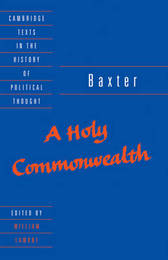
|
Baxter: A Holy Commonwealth
Hardback
Main Details
Description
A Holy Commonwealth was written in 1659 by the Puritan minister Richard Baxter (1615-91), and proved to be the most controversial of all his works. He publicly repudiated it in 1670, and in 1683 the Oxford University authorities ordered it to be part of a book-burning that included the works of Hobbes and Milton. The scandal that surrounded it has obscured its merits as the most candid of confessions as to why a conservative Puritan fought for Parliament in the Civil War and gave his support to the Cromwells. The views it expresses are at variance with the cautious explanations given in Baxter's later memoirs (now seen as a less reliable source than past commentators have presumed). This edition of A Holy Commonwealth makes available to modern readers a work which offers a unique perspective on the relation between church and magistrate and the origins of the English Civil War.
Reviews"Lamont's edition of 'A Holy Commonwealth' judiciously extracts the substance of the full work, including, for the first time in a modern edition, all of the three hundred eighty theses as well as those explanatory comments which contain new material...For the first time, students have access to the full range of Baxter's arguments without having to wade through the original, parts of which are redundant. The result is brilliant." Richard Greaves, Church History
|